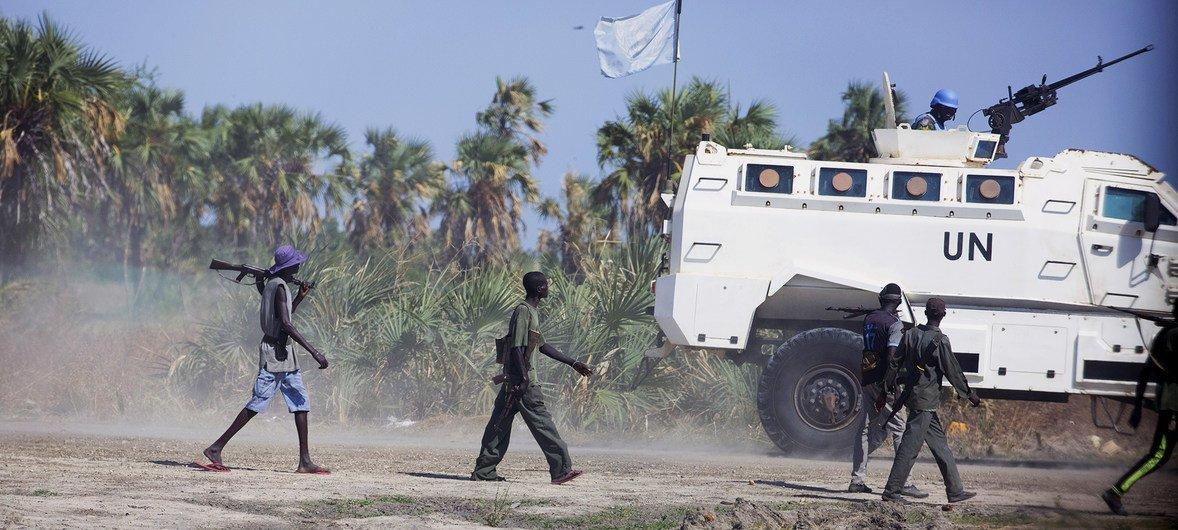Military Rivals Clash As Explosions And Machine Guns Fire In Sudan's capital
No clear winner in streetfighting in Khartoum as dozens are killed and wounded.

UN peacekeepers in Sudan. UN photo.
Sudan’s official army and a powerful paramilitary force fought in Khartoum and elsewhere in Sudan, following more than a month of growing tension between the two groups.
On Saturday morning, there were reports of explosions and gunfire as the paramilitary Rapid Support Forces (RSF) claimed that its troops had seized control of the international airport, presidential palace, and state-run television station, as well as the home of the chief of the army.
The official military and RSF accuse each other of triggering the conflict, in which the Sudanese air force has also been engaged and striking targets. The two armed groups were negotiating a merger as part of the African nation’s lagging transition towards democracy.
American Ambassador John Godfrey tweeted that he was sheltering in place, saying he had awakened to the sound of fighting. U.S. Embassy staff has also taken shelter. “Escalation of tensions within the military component to direct fighting is extremely dangerous. I urgently call on senior military leaders to stop the fighting,” Godfrey declared.
Secretary of State Anthony Blinken released a statement calling on both parties to stop fighting, adding that he is “deeply concerned.”
Social media has broadcast videos that captured jets flying overhead, armed men engaged in firefights, civilians running for cover, and armored vehicles clanking through the streets.
According to Reuters, the Sudanese Doctors Union reported at least 25 fatalities and 183 wounded. While most casualties reportedly occurred in Khartoum, there were also three casualties in the Darfur region, according to the United Nations.
The Sudanese Army is led by Gen. Abdel Fattah al-Burhan, while the paramilitary RSF is led by Gen. Mohamed Hamdan Dagolo, widely known by his nom de guerre ‘Hemedti.’ The latter visited Moscow in February and has been tied to Russia's Wagner Group of mercenaries, who have trained the RSF. 'Hemedti' raised the possibility of a Russian naval base opening up on the Red Sea coast.
Sam Ramani of Oxford University wrote in analysis published by the Middle East Institute: “Hemedti’s trip abroad … burnished his international profile and gave Russia access to a key Sudanese figure with whom it had not previously engaged in any meaningful way.” Amgad Fareid Eltayeb, who served in the civilian government under then-Prime Minister Abdalla Hamdok (2020-2021), said in a report for the European Council on Foreign Relation: “The Kremlin has always preferred Sudan to have an authoritarian government that can make deals without civilian oversight or transparency.” There are reports that Russia seeks Sudanese gold in order to bolster the ruble.
Fears of fighting between the two were piqued on April 13 when Sudan’s army declared that RSF’s movements were illegal. The army and RSF cooperated in the 2019 coup d’état that brought down the Muslim dictator Omar al-Bashir after a civilian uprising. Following a brief period of civilian rule, the two armed forces took power in 2021. RSF was blamed for killing hundreds of civilian protesters, and committing serial human rights abuses.
In December 2022, after the army agreed to allow civilian rule, tensions with RSF over temporary national leadership prior to planned elections scotched the plans.
According to Al-Jazeera, RSF combatants are seeking to seize the army headquarters. At nightfall in Khartoum, fighting still raged as blackouts plagued the city. Electricity towers have been damaged in the fighting. No clear sign emerged of who is currently in control of the conflictive nation.